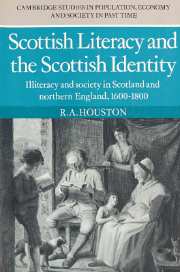 Scottish Literacy and the Scottish Identity
Scottish Literacy and the Scottish Identity Published online by Cambridge University Press: 11 November 2009
So far, we have measured literacy by the number of people who could sign their name to a document. Most historians accept this criterion, but there is still a vigorous debate about what exactly it tells us about reading and writing as a whole. Authorities are also divided about the way in which we should understand the concept of literacy. Yves Castan argues for eighteenth–century Languedoc that sign–literacy does not mean anything apart from a desire for social prestige or a simple business requirement, and should not be used as an indicator of the presence or absence of cultural possibilities. The Swedish historian Egil Johansson, meanwhile, believes that the notion of 'universal literacy' should mean that most of the population can read and compose, but not write, their own language. For eighteenth–century England, Victor Neuburg suggests 'the ability to read a book or single sheet printed in English'. Indeed definitions which attempt to find meaningful indicators of literacy are almost as numerous as there are studies of the subject.
However, in order to compare Scotland with other parts of Europe we need a reliable criterion of literacy, a standard and direct measure which is available in all countries over the seventeenth and eighteenth centuries. To a limited extent we shall consider the difficult problem 'What is literacy?' However, the significance of reading and writing is dealt with more fully in chapter 6 and chapter 7, which cover the uses of literacy and education for the individual and society.
To save this book to your Kindle, first ensure [email protected] is added to your Approved Personal Document E-mail List under your Personal Document Settings on the Manage Your Content and Devices page of your Amazon account. Then enter the ‘name’ part of your Kindle email address below. Find out more about saving to your Kindle.
Note you can select to save to either the @free.kindle.com or @kindle.com variations. ‘@free.kindle.com’ emails are free but can only be saved to your device when it is connected to wi-fi. ‘@kindle.com’ emails can be delivered even when you are not connected to wi-fi, but note that service fees apply.
Find out more about the Kindle Personal Document Service.
To save content items to your account, please confirm that you agree to abide by our usage policies. If this is the first time you use this feature, you will be asked to authorise Cambridge Core to connect with your account. Find out more about saving content to Dropbox.
To save content items to your account, please confirm that you agree to abide by our usage policies. If this is the first time you use this feature, you will be asked to authorise Cambridge Core to connect with your account. Find out more about saving content to Google Drive.